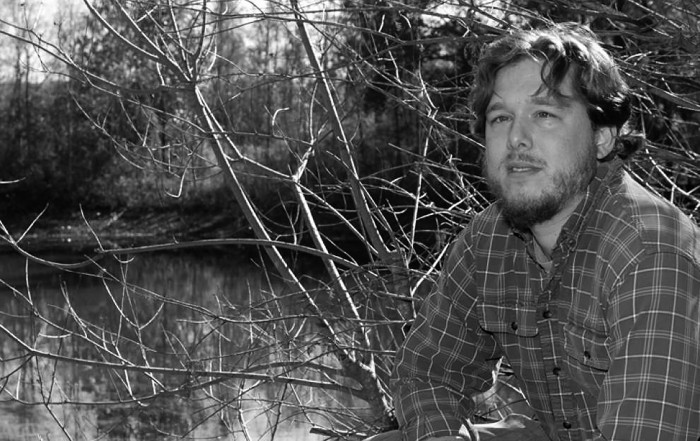Dixon Hearne Interviews David Armand
THE ART OF WRITING
A Conversation with DAVID ARMAND
Author of THE PUGILIST’S WIFE, HARLOW, and THE GORGE
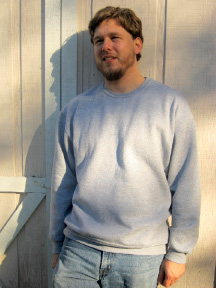
DAVID ARMAND was born and raised in Louisiana. He grew up in the small village of Folsom, where he lived on twenty-two acres of pine-wooded land with lots of dogs and a few horses. He has worked as a telephone operator, a dishwasher, a drywall hanger, a draftsman, and as a press operator in a flag printing factory. He now teaches creative writing at Southeastern Louisiana University, where he serves as associate editor for Louisiana Literature Press. In 2010, he won the George Garrett Fiction Prize for his first novel, The Pugilist’s Wife, which was published by Texas Review Press. His second novel, Harlow, was released by Texas Review Press in September 2013. He has spoken at the Tennessee Williams Festival and the William Faulkner Society’s Words & Music Festival in New Orleans, as well as the Louisiana Book Festival in Baton Rouge, and the Southern Festival of Books in Nashville. David now lives with his wife and two children and has recently completed his third novel.
THE INTERVIEW
Dixon Hearne: Thank you for meeting with me today, David. Can you talk a little bit about your new book, The Gorge, and how you came up with the concept for the story?
David Armand: Sure. The Gorge takes place in the Bogue Chitto State Park in Franklinton, Louisiana. The book takes place in the mid-1980s, though, before the land was a state park. At the opening of the novel, a young girl’s body is discovered in the brush near Fricke’s Cave, which is sort of a geographical anomaly in southeastern Louisiana. The young man who discovers her body is accused of killing her.
Dixon Hearne: What is Fricke’s Cave?
David Armand: Fricke’s Cave is a sandstone “cave” at the head of a giant gorge there in the park. It’s not really a cave, per se, but it’s just an odd formation that stands out among everything else around it. When I first saw this place a few years ago, this persistent image of a body being discovered there just wouldn’t leave me alone. (This is how all of my books start, by the way, with this image that just won’t go away. This one was so strong that I started writing notes on some receipts that were in my car’s glove compartment as soon as my family and I left that place.)
The odd thing is that as I was working on this book, I started reading Dead Man Walking by Sister Helen Prejean and learned that a body actually was left in Fricke’s Cave back in the early eighties. The character that Sean Penn played in the film version of Dead Man Walking was actually an amalgamation of several killers, one of them Robert Lee Willie, who was accused, along with his friend Joe Vacarro, of killing a girl named Faith Hathaway and dumping her body in the cave.
But The Gorge is not a retelling of that story. Instead it is a fictional story of a young man, Tuller, who finds his girlfriend’s body and then gets accused of her murder. Most of the book is told in flashbacks of Tuller’s and his girlfriend, Amber’s, relationship. It’s a love story more than anything else.
Dixon Hearne: Are any of the characters in your book based on people you knew and grew up with?
David Armand: Sure. I think that’s inevitable.Most of the characters in my books are amalgamations of people I know or once knew. No character in my book is an exact replica of a real person, but there are certain traits that I borrow and use for my fiction, absolutely.
Dixon Hearne: Your prose is so careful and precisely written. It’s almost as if every word is carefully chosen. It’s very beautiful the way you write.
David Armand: Thank you for saying that. Being initially trained as a poet, I learned a lot about the economy of language and the importance of using precise imagery and description. I’m also very aware of pacing. Sometimes I will spend hours fretting over a metaphor or an image or the right way to say something. It’s worth it, though. I prefer quality over quantity, for sure.
Dixon Hearne: So how long did it take to write this book?
David Armand: This book has taken me about two and half years to write. I started it on February 17, 2012. I’m still working on edits, but it’s pretty much done. My first two books took about the same amount of time to complete.
Dixon Hearne: Wow, you remember the exact date when you started writing this book? That seems kind of remarkable.
David Armand: Well, I keep very precise records as I work. It’s so important to stay organized as a writer. I know the word count I make each day, when I start a book, when I finish one. I finished writing Harlow, for example, on February 14, 2012.
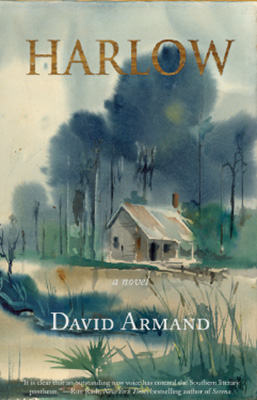
Dixon Hearne: Valentine’s Day?
David Armand: I know. And strangely enough, the last image and line of that book says something like, “keep it there where it is written: in your heart.” That definitely wasn’t a conscious choice, but I think it was certainly a subconscious decision.
Dixon Hearne: And then three days later, you started writing your next book? You must write all the time.
David Armand: I think that’s how I stay sane. How I keep from falling into total despair. Faulkner said that if the writer’s demon-driven with something to be said, then he’s going to write it. That might sound melodramatic, but I think you must be a little bit tortured in some way to want to be an artist. It’s hard work, and the payoff (if any) is few and far between. But of course we don’t do it for the payoff: we do it because we have no choice.
Dixon Hearne: Without giving anything away, was the outcome of your story something you had envisioned from the beginning, or was it something that happened along the way?
David Armand: It definitely happens along the way. Making books can often be like riding down a river: you can never see the end from where you start off. I think it’s good to work like that, though. It requires utmost faith in your craft and your ability, but this approach also adds an element of mystery and suspense to the work that ultimately translates to the reader. If you start to outline or plan too much what you’re going to do, the reader will be able to sense that later on, and it can be the death of your book.
Dixon Hearne: How did you come up with the structure for your novel?
David Armand: I’m glad you asked about that.Structure is so important to me. The Gorge, like my previous two books, is told out of chronological order. To me, a novel is never really interesting unless it experiments with time and also with language. The true artist must be fearless. To me, it would be pretty easy to write a straightforward realistic novel, told in plain language. But that would also be boring. Nothing new. I don’t like post-modern “experimental” stuff like Borges, though: to me, that’s just gimmicky. But I do like writers who take chances, just not those who take stock in nihilism or this idea that we have to be self-referential in order to be interesting. I hate when people try to be too interesting. To me, you either are or you aren’t, you know?
Dixon Hearne: So when you were writing this book, did you have to get in a certain frame of mind in order to write, to see these characters and this place?
David Armand: Well, I live here; I live among the people I write about and, in a way, I’m one of them. I don’t participate in some of the depraved things my characters do, of course, but I can definitely relate to some of their desperation. Sometimes I will write a certain scene or about a certain event and I’ll have to literally recover from it: it’s like witnessing a horrible crime or something, I don’t know. Some people ask me why I write about such dark things and dark places, and I tell them that it’s not something I set out to do, at least not consciously. I think it’s just being honest. Things like this happen, unfortunately, and it’s the artist’s job to record those things as he sees them. Not for shock value or to capitalize off of them, but to be truthful to the reality you know about and have grown up around.
There’s a scene in The Gorge that takes place in a scrapyard that comes directly from an experience I just had: I had to change out my water heater a couple of weeks ago, and I decided to take the old one to a scrap yard by my house. When I got there, I could tell that so many of the people there were selling scrap to either buy food or pay a bill or buy drugs, or maybe all of the above. There was all this protocol you had to follow just to go in and sell your junk. I was thinking of James Dickey’s poem “Cherrylog Road” and when I sat at my desk the next morning, about 3,000 words just erupted: the whole scene I wrote that day took place in a junkyard. I was amazed.
Dixon Hearne: When did you first start writing?
David Armand: You know, as reluctant as I am to say it, I think I was born to be a writer. I have always paid close attention to the mundane details around me (people’s facial expressions, colloquialisms they used, sounds, smells). I suspect a lot of us do this, but I just had an obsession for these things ever since I can remember.
I loved being read to as a small child and I have fond memories of this. I loved the way words looked on the page and the way they sounded when combined in certain ways. I used to try to mix words up or intentionally mispronounce them when I was younger to see what effect it had. I still do this, play with words and sounds.
Once I learned how to read, I read everything: street signs, logos on people’s shirts, you name it. My family would tell me to shut up I would do this so much. But it just felt magical to me, like I found a key to unlock something that I couldn’t understand before. This feeling of magic has never gone away, even to this day.
When I was in third grade, I started drawing comic strips. It was my first real effort at storytelling. I entered a comic that I had made in a contest for the “Just Say No” campaign, which was an anti-drug campaign spearheaded by Nancy Reagan back in the ’80s when I was a kid. I don’t remember how long it took, but eventually I learned that my comic won first prize. I received one-hundred dollars, and my comic was displayed at the Parish Fair. I can still remember what it looked like hanging up there on the bulletin board and the way the hay on the ground smelled and the sounds of the livestock in the same covered building and the feeling I had as people walked past my story and read it. I wish I still had a copy of it, but it’s long gone. That hundred dollars didn’t last long either, I’m sure, but I felt rich.
After that, I started writing little sketches in an old ledger book that my grandfather gave me for collecting stamps. I remember peeling out all of the stamps (probably a really stupid move, as I’m sure those stamps were worth far more than what I was writing in that book) and then writing these little horror stories, à la Edgar Allan Poe, in there.
In high school, I wrote songs and poems. I re-wrote the ending to Kate Chopin’s The Awakening for a class assignment once and the teacher read it out loud to the class. She didn’t read anyone else’s. Mine was pretty offensive, but thankfully she didn’t say it was mine and neither did I.
When I was about fifteen or sixteen I wrote this long stream-of-consciousness narrative in an old blue notebook and showed it to one of my friends (she was a girl I was trying to impress) while we were riding home on the school bus. She was sitting in a different seat from me and when she finished the story, she got up and came to sit by me. The bus was nearly empty by then and I remember being so nervous that she was going to dismiss my story or dislike it, but to my surprise she seemed genuinely blown away by it. I’ll never forget that. The next day, I showed it to another girl in one of my classes and I remember watching her read it; she was completely focused on it and she was ignoring the teacher’s lesson, and then she just handed the notebook back to me when she finished. She didn’t say anything but I thought that she liked the story since she was unusually nice to me from then on. I don’t know though.
Other than those two girls, I never showed my writing to anyone. I don’t think my family knew I was writing stories or that I was interested in that. I read a lot, they knew that much, but I don’t think they knew I was interested in writing until way later. It wasn’t until I was in college that I started getting support from my teachers.
Unfortunately, I burned those old notebooks along with a whole entire box of writing that I did on an old electric IBM typewriter that my grandfather gave to me (I can still smell the grease on the inside of that clunker). A part of me wishes I still had that old work, but in a way, I’m glad it’s gone.
Dixon Hearne: So how is life for you now, compared to when your first book was published?
David Armand: Well, I’m still teaching. I have to pay the bills. But I have definitely appreciated the attention my work has brought to me. I’ve gotten a lot of emails from readers telling me how much my books have meant to them, particularly Harlow. I think they can relate to the pain the characters experience in the book, probably because it’s pain that I’ve experienced in my life as well. That translates onto the page. But those emails have meant so much to me. Writing can be a lonely job, but when you can communicate with readers and other writers, it makes it more bearable.
Dixon Hearne: You’ve had several book signings, I’ve noticed, like at Octavia Books in New Orleans. And you’ve been on a book tour. How has that been?
David Armand: It’s been great. Like I said, writing itself is lonely work, but when you get to meet with people who care about books and can understand the characters in your own work, you can’t ask for anything more. You really can’t.
Dixon Hearne: What books did you read growing up?
David Armand: I read so much when I was a kid. The first book I ever read in its entirety was Around the World in 80 Days by Jules Verne. After that, I read Adventures of Huckleberry Finn, then I started reading Jack London and Edgar Allan Poe. I loved reading The Hardy Boys, too. When I got a little bit older, I started reading Stephen King. I think I learned a lot from everything I’ve ever read. Even the bad stuff.
Dixon Hearne: Who else influenced your work?
David Armand: Definitely William Faulkner, Cormac McCarthy, Charles Frazier, Daniel Woodrell, Flannery O’Connor, Larry Brown. All for different reasons.
I also had the great fortune of having some really good teachers when I was in college. Particularly my writing teachers Jack Bedell, Norman German, and Tim Gautreaux showed interest in my early efforts and all were more than generous with their time and support. Their kindness and willingness to share what they knew with me, just a young kid, will never be forgotten.
Dixon Hearne: Your work has been compared to a handful of those writers you mentioned. How does that make you feel?
David Armand: Yes, I have been fortunate (or unfortunate, depending on your point-of-view) to be compared to those writers I mentioned. These are all of my favorite writers, so on the one hand, it’s a great honor, but on the other, I wonder if these comparisons are detrimental to me. I mean, I think this is what Harold Bloom called the anxiety of influence, and I don’t want to work under the shadows of these great writers and simply be a copy of them. I would like to have my own distinct voice. I suspect that Cormac McCarthy literally moved from Tennessee to New Mexico (or wherever he lives now) just to get from underneath Faulkner’s indomitable shadow. I think McCarthy’s first books are great, but they were often criticized for being too reliant on Faulkner’s models, so I can’t help but think he moved somewhere new just to get away from that. His first “Western” book, Blood Meridian, clearly got him out of that rut, if you could even call what he was in a rut, in the first place.
I was at a reading recently where one of the audience members asked the author if it made him feel good that his work was compared by reviewers to all these other great writers and he said that he didn’t really pay much attention to that, that the reviewers had to say something, and often our only outlet for description is comparison: that’s why we use metaphor. Because we just can’t put our minds around a good enough description, so we make a comparison. It’s human nature, you know.
One time I was in a bar and a girl came up to me and told me that I looked like Matt Damon just because I think she wanted me to buy her a drink. I know that I don’t look like Matt Damon, but I bought her that drink anyway, and it cost me twelve bucks. But it was worth it.
So people can compare my work to whomever they want to so long as it gives someone else a good point of reference and maybe makes them want to read what I have to say.
Dixon Hearne: Has there been any talk of turning your books into a film?
David Armand: Not that I know of, but one can hope (laughs). Of course, I would love to see any one of my books turned into a film. If for no other reason than to help me pay off my mortgage. I’ve seen some great film adaptations of books and of course I’ve seen some disappointing ones.
But if Harlow were ever made into a film, I would love to see Tye Sheridan play the boy Leslie. Sheridan is about eighteen (the same age as Leslie), he’s got that gritty look about him, and he’s a phenomenal actor (he played in Terry Malick’s last movie, and more notably he was in Mud with Matt McConaughey). He’s in an adaptation of Larry Brown’s novel Joe with Nick Cage, which was written by Gary Hawkins. I just think this young man would be great for this role.
And since he had such great chemistry with Matt McConaughey in Mud, I would be happy to see Matt McConaughey play Harlow, Leslie’s father. McConaughey has that great Southern drawl and that gritty look about him, too. Yeah, I could see him playing Harlow Cagwin, for sure.
Dixon Hearne: What is your writing process like, or what is a day of writing like for you?
David Armand: Writing novels is a lot like laying bricks, carefully placing one square at a time and adhering those bricks together with mortar. But every novelist’s process is different, you see.
Personally, my process goes like this: I read all the time. When I’m reading a book that is particularly well-written (one, say, by Cormac McCarthy), I keep a pen and a piece of paper or an index card and I write down every word that resonates with me. For example, when I read Charles Frazier’s Cold Mountain for the first time, I had about six or seven note cards with words like “spurtle,” “piggin,” and “scarp” written on them. Those words resonated with me, had a certain feeling attached to them, a feeling I knew I wanted to have in my work-in-progress at the time. Those words become the bricks that started to make the wall of the novel. Too many writers today seem to forget the utter power that a single word (and the right word) contains, and therefore they miss the mark because their focus is too heavy on story or gimmick or idea that they forget why they came to the page in the first place: language and the fearless worship of it.
While I don’t write every day, I do feel as if I am writing incessantly, as I am always thinking about stories and how to make them.
While working, I keep my index cards and notes close by, referring to them for the right word or image as I go. Then I start to think about structure and how the story is told. I print out hard copies of the novels and mark them up with a red pen, then a black pen, then use a highlighter to mark off the changes.
Dixon Hearne: Do you ever write with a pen and paper?
David Armand: Sometimes I do. I keep a stack of yellow legal pads in my desk drawer and I will write in them a lot. I find that when I hand write a section, it makes it easier when I type it up to do the editing as I go along. There’s something kind of romantic about handwriting a novel, even though it’s definitely less convenient.
Dixon Hearne: Who reads your work first?
David Armand: I have a couple of readers with whom I share my work. The great thing is that each of them reads for different things, and I can count on them for honest feedback. Some of the best advice has come from my close friends.
Dixon Hearne: Do you write any poetry?
David Armand: Not so much anymore, but as I’ve said, I started off my training as a poet, and I think that has really helped me as a novelist. Faulkner used to say that all novelists are failed poets, and I tend to agree with that. I do have a handful of poems that I might work on a little bit one day and send out to a magazine or two.
Dixon Hearne: Have you written any short stories?
David Armand: Yes, after I wrote a lot of poems, I moved up to the next longest form, which for me was the short story. I really worked on that craft for a while, making a handful of stories that I collected in my graduate thesis, Mae’s Blues, which I had the pleasure of working with Tim Gautreaux on. I published a couple of those. I also like to try to pull out sections of my novels and publish those as stand-alone pieces. That’s seemed to have worked well for me, too.
Dixon Hearne: How did you go from writing your first book, to getting it published?
David Armand: After I finished writing The Pugilist’s Wife, I submitted it to agents and independent presses for about two years. I also submitted it to several contests. One of the contests I sent it to was run by Texas Review Press over at Sam Houston State University in Huntsville, Texas. My novel went through the rounds of blind judging and made it out on top. Then the day that changed my writing life was November 8, 2010, when I received a phone call from Paul Ruffin, the director of Texas Review Press. He called to inform me that my novel had won the 2010 George Garrett Fiction Prize. The novel was published the next year. Two years later, Ruffin published my second novel, Harlow.
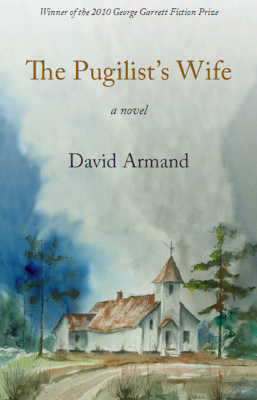
So that is why I always suggest to authors who are spending years of their lives trying to find an agent first and then go that route to a publisher, just submit your work to contests. Winning or even placing can get the attention of agents, or even land one a publishing deal with the sponsor of the contest, if that happens to be a press, as it was in my case.
Dixon Hearne: What are your plans for the near future?
David Armand: I recently learned that I was accepted to the Sewanee Writers’ Conference in Tennessee. So I’ll be going there at the end of the summer. I have a couple of book clubs I’ll be meeting with this summer as well. If I get an advance or something for my next book, I’d like to buy a boat. I think that would be a good way to celebrate. I’d love to teach my kids how to fish, and to just spend some time on the water.
Dixon Hearne: Great, David.Thank you for your time. It’s been a pleasure meeting and talking with you.
BIO
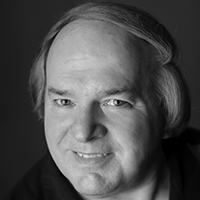 Dixon Hearne is the author of a textbook, three short story collections and editor of several anthologies. His fiction has been twice nominated for the Pushcart Prize and the Hemingway Foundation/PEN award and winner of many other awards. Other work can be found in Louisiana Literature, Mature Living, Wisconsin Review, Louisiana Review, Cream City Review, New Plains Review, Roanoke Review and many other magazines, journals and anthologies. Visit: www.dixonhearne.com and Wikipedia http://en.wikipedia.org/wiki/Dixon_Hearne
Dixon Hearne is the author of a textbook, three short story collections and editor of several anthologies. His fiction has been twice nominated for the Pushcart Prize and the Hemingway Foundation/PEN award and winner of many other awards. Other work can be found in Louisiana Literature, Mature Living, Wisconsin Review, Louisiana Review, Cream City Review, New Plains Review, Roanoke Review and many other magazines, journals and anthologies. Visit: www.dixonhearne.com and Wikipedia http://en.wikipedia.org/wiki/Dixon_Hearne

